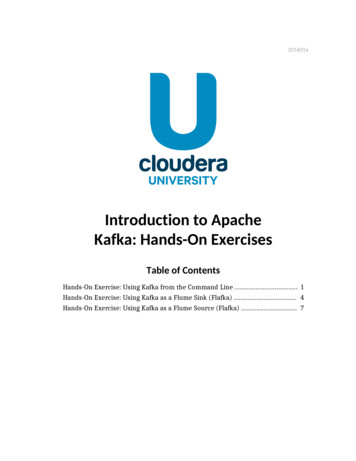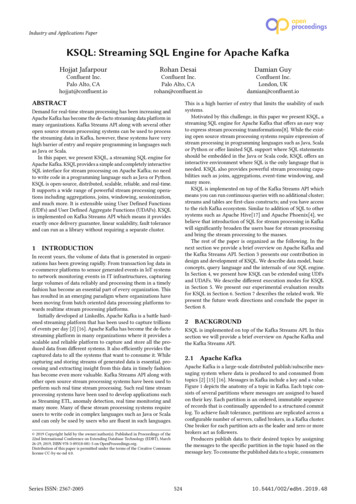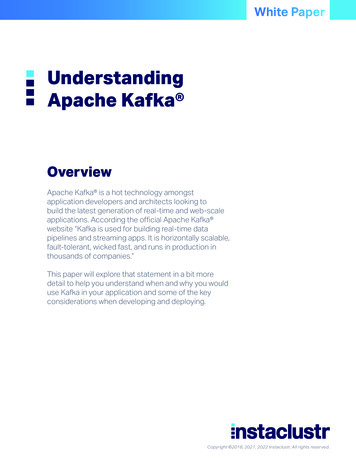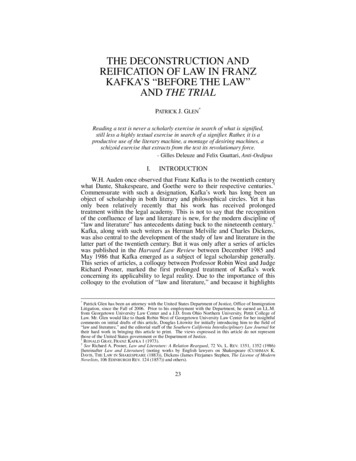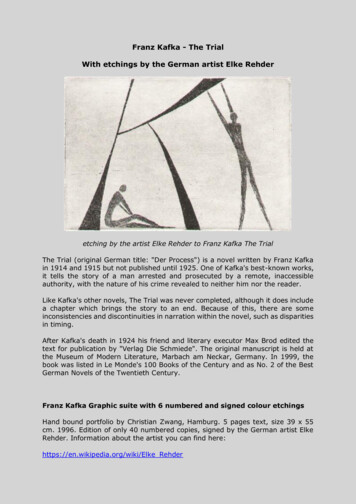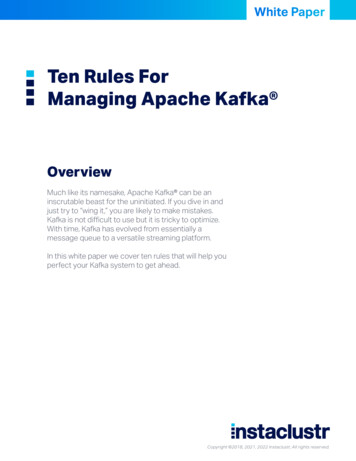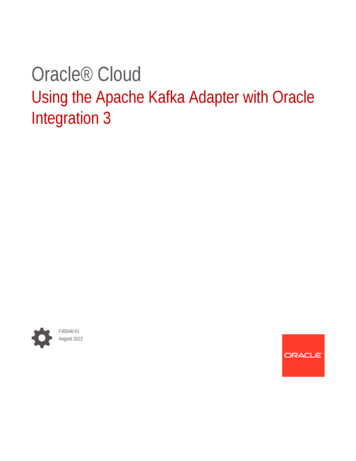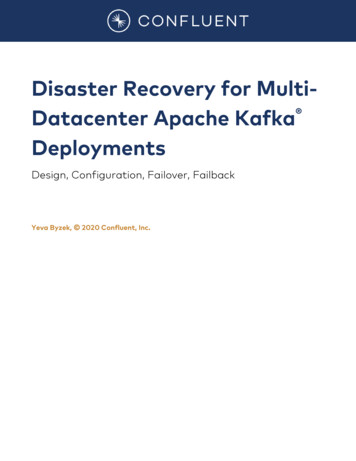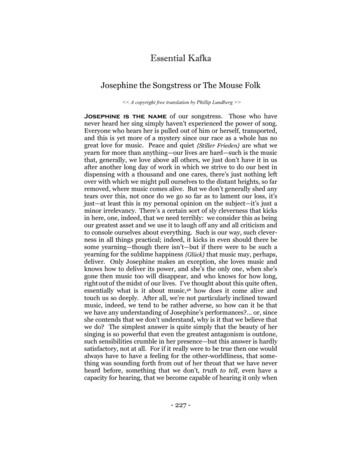
Transcription
Essential KafkaJosephine the Songstress or The Mouse Folk A copyright free translation by Phillip Lundberg Josephine is the name of our songstress. Those who havenever heard her sing simply haven’t experienced the power of song.Everyone who hears her is pulled out of him or herself, transported,and this is yet more of a mystery since our race as a whole has nogreat love for music. Peace and quiet {Stiller Frieden} are what weyearn for more than anything—our lives are hard—such is the musicthat, generally, we love above all others, we just don’t have it in usafter another long day of work in which we strive to do our best indispensing with a thousand and one cares, there’s just nothing leftover with which we might pull ourselves to the distant heights, so farremoved, where music comes alive. But we don’t generally shed anytears over this, not once do we go so far as to lament our loss, it’sjust—at least this is my personal opinion on the subject—it’s just aminor irrelevancy. There’s a certain sort of sly cleverness that kicksin here, one, indeed, that we need terribly: we consider this as beingour greatest asset and we use it to laugh off any and all criticism andto console ourselves about everything. Such is our way, such cleverness in all things practical; indeed, it kicks in even should there besome yearning—though there isn’t—but if there were to be such ayearning for the sublime happiness {Glück} that music may, perhaps,deliver. Only Josephine makes an exception, she loves music andknows how to deliver its power, and she’s the only one, when she’sgone then music too will disappear, and who knows for how long,right out of the midst of our lives. I’ve thought about this quite often,essentially what is it about music,46 how does it come alive andtouch us so deeply. After all, we’re not particularly inclined towardmusic, indeed, we tend to be rather adverse, so how can it be thatwe have any understanding of Josephine’s performances? or, sinceshe contends that we don’t understand, why is it that we believe thatwe do? The simplest answer is quite simply that the beauty of hersinging is so powerful that even the greatest antagonism is outdone,such sensibilities crumble in her presence—but this answer is hardlysatisfactory, not at all. For if it really were to be true then one wouldalways have to have a feeling for the other-worldliness, that something was sounding forth from out of her throat that we have neverheard before, something that we don’t, truth to tell, even have acapacity for hearing, that we become capable of hearing it only when- 227 -
228Josephine the Songstess or The Mouse FolkJosephine sings, she and she alone, nobody else delivers. But frommy vantage I’d have to say that this just isn’t so, at least I haven’thad such an experience and I haven’t been able to observe anyoneelse experiencing something like this either. In private conversations amongst trusted friends we admit this quite openly, thatJosephine’s songs aren’t, as songs go, anything all that out of theordinary, there’s nothing essentially miraculous about them. And,is it even song at all? Despite our fundamental lack in thingsmusical we do have a substantial history that has come down to usabout singing; in earlier times our forefathers were musical—thereare legends that inform us about all of this and, indeed, even still wehave some of these songs though, to be sure, nobody has any idea asto how they’re to be sung. I don’t know why it is that in the courseof centuries we became so thoroughly disinterested in any sort ofmusic, that, indeed, we became fundamentally hostile toward it,perhaps this is due to our particular destiny, that somehow we werechosen for this: that we worship stillness, stepping back withinourselves and not really being committed and, so, in all actuality wedon’t have much choice in this. But however all of this may be, westill do have some premonition of what song is and our premonition,to be perfectly honest, goes against her artistry, what Josephineactually does when she’s singing. For, taken in an absolute sense,is this really singing at all?—perhaps, indeed, all that she reallymanages to do is a sort of whistling? And everybody knows whistling inside and out, this is the core artistry of our folk or, rather, it’snot even deserving of the name “art,” rather it’s simply how youwould characterize us, this is what we do: a soft kind of whistlingwith an undercurrent that hisses; and there’s really just two sorts:the melancholic, ascetic, dreamy sort that typically is weak andpervasive; and then there’s the triumphant, full-bodied tone thattends to have sharp contours. Thus, we’re all natural born whistlersand nobody would ever think about labeling this as being art;sure, now and again somebody might do a bit of research into thispropensity of ours and how it contributes to some particular topic,but in general everybody whistles without even thinking about itand, indeed, without even so much as noticing it and, moreover,it’s quite certain that the greater majority don’t even know thatwhistling is the one characteristic that defines who we are mostintimately.47 If, then, if it were to be true that Josephine doesn’tsing but just whistles, and indeed, as it seems to me, that herwhistling barely exceeds the bounds of the ordinary, that really herpowers in whistling don’t even extend into the triumphant sortmentioned earlier whereas the whistling of our typical laborer, A copyright free translation by Phillip Lundberg
Josephine the Songstress or The Mouse Folk229someone who is quite down to earth and who whistles the whole daylong without any particular effort, that this just goes hand in handwith his earthly travails, well, if all of this were to be true then,indeed, Josephine’s purported artistry would be refuted—but now,first and foremost, now we’d have to face up to this riddle as to whyit is that her performances are so electrifying! And really, when youget right down to it, it’s not merely whistling, this is not everythingthat Josephine exhibits in her performances—you need only placeyourself in the back of the auditorium and listen attentively or,better yet, test this out in the following manner: if Josephine issinging amongst a group of others and if you should give yourselfthe task of making her voice out from amongst these others thenwithout fail you won’t be able to distinguish anything else but atypical, middle-of-the-road sort of whistling that, at the most, is abit sweeter or somehow softer and this is the only distinguishingcharacteristic that you might hear. But then, if you stand therein front of her so it’s not merely whistling, there’s yet anothercomponent that’s absolutely required if one is to understand her artproperly, namely that you don’t merely listen to her, rather you alsohave to see her. Even if it were to be nothing more than oureveryday whistling, still there’s this oddity of how she presentsherself, the drama and theatrics of her performance—that someonewould put on such airs and then do nothing more than what’stypical, the ordinary, middle-of-the-road sort of whistling. Crackingpecans doesn’t entail any particular artistry, none whatsoever, hencenobody would be so daring as to gather up an audience and then forhis performance that he would shell a pound of pecans. But, all thesame, if one were to do just this and if one’s performance were tobe a great success, well then, obviously it couldn’t possibly simply bea matter of cracking nuts! Or maybe it does have something to dowith nut-cracking but it suddenly has become apparent that there’smore to cracking nuts than meets the eye, that we’ve been overlooking something because we just happen to be so good at it and thatonly now its innermost essence has been put up on display wherebyit is even quite conceivable that this might be a distinct advantageand quite useful, namely that the artist performing such a feat isn’treally all that good at cracking nuts to begin with. Perhaps just thisis the proper correlation for our appreciation of Josephine’s musicalperformances: that we stand in awe before her for doing somethingthat we do all the time ourselves without being amazed in the least.In any event, we’re all on her side, we find ourselves totally ‘at one’with her and we agree about this. Once I was present as somebody—as only might be expected—somebody was pointing out to her how A copyright free translation by Phillip Lundberg
230Josephine the Songstess or The Mouse Folkour folk in general tend to whistle, and he was quite modest andmatter of fact in how he brought this up, like if someone would havebeen talking to somebody who is rich and might mention by the waythat although he isn’t rich himself, all the same, he isn’t starving,and that by mentioning this one isn’t trying to hurt this wellheeled lolloper at all, that rather he should go ahead and enjoy hiswealth without any worries about it. But for Josephine this wasjust too much!—she got so cheeky, such a superior, condescendingsmile played upon her lips such as, until then, I had never seen—shewhose external demeanor is truly as sweet as sweet can be, that evenin our folk where the fair sex always tend toward being affable,Josephine still stands out in her charming amiability but now sheseemed downright crude; it may be that due to her heightenedsensibilities as an “artiste” she noticed this right away too and, so,she got a better grip upon herself. In any event, she denied thatthere might be any relation whatsoever between her art andwhistling and for those who think otherwise all that she has iscontempt and, most probably, pure hatred that, naturally, she triesto cover up and she won’t even admit it to herself. And it’s not as ifshe did this for her own benefit since these contrarians—to whichcamp I myself halfway belong—we don’t find her performances to beany less amazing than everybody else, we’re just as much amongstthe overwhelming crowd of her admirers; but Josephine, Josephinedoesn’t want simply that she amaze her audience, rather she wantsto amaze us in her own particular manner, amazement in itselfdoesn’t mean a thing to her. And when you take your seat in herauditorium then you understand her position, opposition is onlypossible at a great distance; sitting there before her it’s quite clearthat what she’s whistling is no whistling. Since whistling belongsamongst our unconscious habits, our second nature as it were, soyou might think that people would whistle in her auditorium; afterall we feel good in her presence and we tend to whistle wheneverwe’re feeling good; but nobody whistles in her presence, rather, it’sas still as still can be—quiet as a mouse—it’s as if the peace thatwe yearn for and which our whistling would disturb, it’s as if thispeace were to be partially granted to us and, so, we stay silent. Is ither singing that so captivates us? or rather, much more, is it thecelebratory sobriety of our stillness that encompasses her weak,little voice? It once happened that some small urchin, an innocentlittle thing, started into whistling during one of Josephine’sperformances. Now, it was quite the same as what we were hearingfrom Josephine there up in front—and totally unconcerned aboutthis unexpected variation in her routine Josephine continued right A copyright free translation by Phillip Lundberg
Josephine the Songstress or The Mouse Folk231on in her timid whistling, and so here within the public this littlechickabiddy having inadvertently forgotten herself was whistlingalong too But you better believe we hissed and whistled thisdisturbing non-entity back to silence and did so even despite the factthat this wouldn’t really have been necessary for it’s quite certainthat the little thing would have been happiest if she could have creptaway on all fours and hidden herself in some hole due to her shameand angst whilst in the meantime Josephine’s vocal prowess startedinto whistling triumphantly and due to her self-satisfaction shebecame practically ecstatic, what with her arms splayed out to hersides and her throat that couldn’t possibly be extended any further.In any event, all of this is simply standard fare for Josephine—anyminor irrelevancy, some chance event, the most picayune disorderor bit of unruliness, a creaking noise coming from somewhere highup in the parquet, somebody who’s gritting their teeth, even theslightest malfunction in the lighting, she uses all of these to heightenthe effect of her performance, in her opinion she’s singing to deafears anyway—though there’s never any deficiency in spiritedenthusiasm or applause—but then, in respect to any real understanding in the particular way that Josephine means it, well, this isjust something that she’s learned to do without and so all of thesedisturbances simply play into her hand, everything that conspiresagainst the absolute purity of her voice, all of this is an easy battle,indeed it’s no battle at all, simply by means of this contrast shecomes off victorious, all of this helps her along to wake up thecrowd, not that this would teach them any real understanding butstill it teaches respect, it gives them a premonition of what’s at stake.And it wouldn’t be beyond the pale that one might think that she—just for instance—that she herself had somehow had a hand ininstigating that the little tike formerly mentioned might pipe up ifonly this wasn’t contradicted by her dream-like, confused state thathasn’t the least bit of concern nor any respect for doing anythingin accordance to the normal strictures of cause and effect, rathershe’s always acting ‘the artiste.’ And if small co-incidences play intoher hand how much more so would the great. Our life is so terriblybeset by strife, every day brings its share of rude surprises, fears,hopes and shocking outrages—it’s simply impossible that any one ofus might bear it, fortunately the individual gains strength by beingcarried along day and night upon the shoulders of the community,but even so it’s terribly bleak and difficult, often enough millionsof our folk tremble beneath the weight of the burden that is placedupon just one. Then Josephine intuits that her time has come.Already she’s standing there, the tender soul, there’s a spot beneath A copyright free translation by Phillip Lundberg
232Josephine the Songstess or The Mouse Folkher breast that in rapport to the angst of the times starts to vibrate,it’s as if all of her powers were gathered up within her piteoussong, as if everything that wasn’t directly involved in her expressingher song, all extraneous concerns, powers and possibilities wereremoved, that she’s totally stripped, sacrificed and under the mercyand protection of angelic beings, as if she were so exposed thatduring this interval of her rapture whilst her inner being is so takenup in expressing song, well, a cold draft of air that simply mightbe passing by would be all that it would take to kill her. But it’sprecisely in such moments as these with this spectacle before us, it’sthen that we contrarians—and we’re the first to admit our contrariness—it’s now that we can’t help but to remark to one another: Shecan’t even manage to whistle decently, just look at how she windsherself into knots and not that she’d be singing—let’s not talk aboutsong—but just so that she might force out a smidgen of piping, theregular sort of whistling that’s heard even in the most rustic partsof our homeland. So it seems to us, but, as I already mentioned,this is simply a momentary impression and one that is a necessarypreamble but also one that passes very quickly. Already we’re beingenveloped by the receptive feelings of the multitude, the warmth ofthe crowd with one body pressed up upon the next, all so timid andlistening in rapt attention and with bated breath. And that a crowdgather, us—we whose lives are always being thrown about this wayand that, always in a great rush to get somewhere, though not thatwe’d have any clear conception as to what all the ruckus reallymeans—and all that Josephine generally needs to do is throw backher head, open up her little mouth halfway, her eyes resting uponsome visage up in the heights and, so, she assumes her stance thatannounces to us that now she’s ready to sing. She can do thiswherever she likes, it doesn’t have to be in a spot that’s particularlyaccessible, any hide-away will do, some corner that she’s picked outjust as her mood strikes her, some spur of the moment decision, anyspot is as good as the next. The news that she’s ready to sing travelsfast and in no time the procession of listeners is streaming in. Nowfrom time to time, indeed, there are hindrances that crop up; it’sduring times of calamity that Josephine loves to sing most of alland it’s even then that our cares and urgent concerns become aswide-ranging as they can be and they drive us into paths that areutterly diverse; even with the best of wills it’s not always possibleto assemble a crowd on a moment’s notice in accordance toJosephine’s mood and, so, she’s left standing there in her greatpose for a longer period without having a sufficient audience then,indeed, then she becomes enraged, livid—she’ll start stamping her A copyright free translation by Phillip Lundberg
Josephine the Songstress or The Mouse Folk233feet and cursing, the things that she says! unladylike in the extreme,indeed, she even bites. But, all the same, even this doesn’t wreckhavoc on her reputation, rather than try to talk sense into her everyone does their utmost to fulfill her expectations, messengers aredispatched to expedite the gathering of an audience; but this isn’tdone openly, it’s all kept hush-hush, one notices that sentries havebeen posted at various intersections and these clever accompliceshave a special way of winking at you—that you’d better get moving abit quicker—and all of this happens behind the scenes until finallya sufficient crowd has come together. Now, what is it that spursour folk on, that we make every effort in satisfying Josephine’swhims? This question isn’t any easier to answer than the underlying question to which it’s easily tied, to wit: What is it aboutJosephine’s songs, why is it that we’re so captivated by them? Thefirst question could be struck out all together as being totallysubordinate to the second, if only we were able to affirm that ourfolk really is committed to Josephine—be it because of her songs ordue to whatever else—in an unqualified way. But then, this isn’t thecase either, there’s hardly anything to which our folk is committedin an unqualified manner, we hardly know what we’re to think ofsuch limitless adoration; our folk, these critters that, indeed, lovethat sort of cleverness which, in itself, is quite harmless: childishwhisperings, the chitter-chatter that proves how well we’re able tobring our lips into motion, how far is it from us that we’d ever sayanything bad, such a folk is simply incapable of devoting itself toanything without some qualification and Josephine has a feelingfor all of this, she’s nobody’s fool and, indeed, it’s even precisely thisthat she’s up against, fighting against it with all of the strengthshe can muster with her weak throat. But now, naturally, one alsomustn’t go too far in such general platitudes, one always has toreserve one’s judgment and, verily, our folk is devoted to Josephine,just not unconditionally. For instance, nobody would ever find itallowable to laugh at Josephine. One is permitted to admit thismuch: there’s an awful lot about Josephine that tends toward thecomic, in and of itself we all enjoy having a good laugh, despite all ofthe misery and absurdity of our lives we’re always ready, at least toa certain extent, to crack a good joke about whatever it ever may be,but we don’t ever crack jokes on Josephine’s account. SometimesI get the impression that our folk conceives its relationship toJosephine in the following manner: that she, this fragile, attentiondependent, extra-ordinary (and in her own opinion extra-ordinarydue to her singing)—this entity, Josephine, would be entrusted to usand that it would be incumbent upon us that we take good care A copyright free translation by Phillip Lundberg
234Josephine the Songstess or The Mouse Folkof her; whatever underlies all of this probably isn’t particularlyclear to anybody but still this fact remains apparent nonetheless.One simply doesn’t make jokes about someone over whom you areentrusted; you can laugh about yourself but not about your fledgling,laughing about such a being would be tantamount to breaking yourpledge, a dereliction of duty; it is the extreme in maliciousness whenthose amongst us having malice inflict upon Josephine the followingobservation, an observation that I’ve heard from time to time: thatwhen Josephine comes before us we lose our capacity to laugh.Thus it is that our folk cares for Josephine in the manner of a fatherwho has taken on the burden of bringing up a child, a child whosearms are stretched out toward you, one doesn’t know whether thesehands are pleading or exacting.The overriding concern isunavoidable: do we have it in us that we tend our foster child as isrequired? But, in all actuality, in this particular instance we fulfillour responsibilities impeccably. I certainly could never do it alone,nor could anybody else do so as an individual, but what nobody iscapable of doing alone we do manage—and most readily manage—toaccomplish as a community. To be sure, the difference in powerbetween the folk as a whole and their fledgling is so immense, it’salready quite sufficient when we pull the tender thing within thewarmth bestowed by our community, already this alone suffices andour fledgling is protected. Admittedly, nobody would dare to discusssuch things with Josephine. “Phooey on your protection” she’d pipeup. “Yea, yea: whistle as you will”—that’s what we’d think, but we’dnever say it. And beyond all of this it’s not truly a refutation whenshe acts so rebelliously, much rather this is simply what’s naturaland what one should expect from a child, this is the way thatchildren demonstrate their thanks and, then too, it’s in the nature ofa father that he simply ignores the whole thing and goes his merryway. Now, there’s a lot more in play here that’s quite difficult toexplain simply in hindsight to the relation sketched above, thisrelation between our folk and Josephine. Namely, Josephine iswont to take a position that is diametrically the opposite to this, shebelieves that it falls upon her and her alone, that she protects us,the community. The way that she sees it is that it’s only through hersongs that we are to be saved from all of the evil inherent in ourpolitical and economic reality, it’s nothing short of this that underlies her singing, and even if it should be true that these songs areincapable of driving away and dispelling all of our misfortune andmisery {Unglück}, the sad lot of our destiny, well at least they willgive us the strength so that we might bear them. Indeed, she doesn’tsay it quite like this, nor would she say anything else but this, point A copyright free translation by Phillip Lundberg
Josephine the Songstress or The Mouse Folk235of fact, she hardly talks at all, she remains silent amongst theblathering bimbos; but still, this is the fire that blazes from out ofher eyes, this is what lurks behind her tight-lipped glare; butamongst us there’s hardly a soul who can hold his mouth shut andrefrain from chattering, but she can do this, it’s writ large on herfeatures. By every piece of bad news, and on most days the badnews far outweighs the good, any number of horrible reports flow inupon us and each one of them overrunning the previous, and all ofthem borne along amongst an awesome amount of lies and halftruths, when suddenly she gets the urge to rise up to the occasion—though on most days all of this just weighs her down closer to thefloorboards—but now she’s pulled herself up and is extending herthroat out, she’s trying to get an encompassing view over her flockjust as if she were a shepherdess overseeing her sheep before anapproaching storm. Certainly, there are also children who rebelagainst the ways of the world in such a wild, uncontrolled manner,but with Josephine this has a foundation that has a bit moresubstance. Though, indeed, she doesn’t save us, nor does she supplyus with any powers that might be decisive, it’s all too easy to playthe role of savior when you’re dealing with such a folk like us: we’reused to suffering, well acquainted with death, not given to pretense,fast in our decision-making, only apparently angst-ridden in thisatmosphere of great daring and heroics in which we’re constantlymaking do, living out our lives and, beyond all of this, our fertility isas legend as our audaciousness; it is so easy—as I’ve said—that oneplays oneself off as the savior for such a folk, a folk that somehow orother manages to save itself though not, let us never forget, notwithout terrible sacrifices over which the historians, and in generalwe really do neglect doing all that much in viable historical research,the historians, as I say, those who preserve the actual in theirmemories of the past: their blood runs cold and simply paralyzesthem due to the shocking horror, all of the horrors through whichwe’ve come! But still it is true that in the times of our greatestdespair, this is when we listen most attentively to Josephine’s voice.All of the forebodings, the threats that are gathering above us, allof this tends to make us calmer and more humble, we’re moreeasily molded and responsive to Josephine’s commanding presence,we’re more than happy to gather together and press up against oneanother and even the more so due to the circumstance that ourgathering is far removed from the major dilemma that torments us.It’s as if we’d want a quick—true, all too true, speed is always paramount, this is something that Josephine is wont to forget all tooreadily—a quick pick me up, to drink a cup from the fountain of A copyright free translation by Phillip Lundberg
236Josephine the Songstess or The Mouse Folkpeace before venturing out into the calamities of battle. It’s not somuch a vocal performance as it is an assemblage of the populace, anassemblage in which except for the slight whistling coming fromcenter stage up front, besides this it’s totally silent, the hour is fartoo serious for any idle gossip! Such a relation is not what is neededand it’s impossible that this, indeed, would ever satisfy Josephine,nor is this even something that might be maintained for long.Despite all of her nervous anguish that overcomes her, filling herwith unhappiness due to her position that has never been clarified,there’s a great deal that she, blinded by her self-consciousness,doesn’t see, and it doesn’t take all that much effort for her blind spotto be enlarged considerably, there’s a swarm of her adherents whoare constantly flattering her, egging her on, and in doing this theyperform a useful function though, to be sure, all of this happens offto one side and out of the limelight, that she might sing for them insome remote corner, and were it not for them it’s certain that she’dnever have the nerve to pull off the sacrifice needed to sing, that shedo so even despite the enormity of the undertaking. And it’s not asif it were all for nothing for then her artistic performance doesn’tremain unnoticed. Despite the fact that we’re consumed withmatters that are wholly ‘other’ and that our stillness is not simplydue to our devoted appreciation of hearing her sing, that there arequite a few of us who don’t even cast our eyes her way, rather thereare so many whose faces are pressed into the fur of their neighbor,and so it seems as if Josephine’s performance was all for nothing,that her great effort would be futile, all the same one cannot deny it,something does force its way through, something of her whistlinginevitably does strike us. Such a whistling that rises up where everyone else is required to remain silent, this just about comes off as amessenger of the folk to the individual, Josephine’s diaphanouswhistling right into the midst of the dead seriousness48 of thedecisive decisions, this is almost a metaphor for the impoverishednature of our folk’s existence in the midst of the tumult of a hostileworld, a world that, quite simply, is overbrimming with enemies.Josephine makes her stand, this excuse of a voice, this nothingness,this abysmal execution asserts itself and creates a path to us—it doesone good to reflect upon this; were we to have a real artist, someonewho actually could sing, if ever such a one might appear amongstus it’s quite certain that we wouldn’t be able to bear it in times likethese and with one voice we’d denounce the senselessness of such aperformance. May Josephine be protected from ever recognizingthis fact, the fact that simply by listening to her, this itself provesthat her artistic performance isn’t really song. Most probably she A copyright free translation by Phillip Lundberg
Josephine the Songstress or The Mouse Folk237has some premonition of this—why else would it be that she’s soinsistent in denying that we’d be listening to her; but she alwayssings anyway, she whistles her tunes in spite of her premonition.But, all the same, there is yet a consolation for her for, indeed, toa certain extent we really do listen, probably in a similar manneras one would listen to a genuine artist, she achieves results thatsuch an artist would be vain to attempt in our presence and that areonly to be achieved quite specifically by means that are insufficient.This, very probably, this is connected to the way that our lives arestructured. In our folk nobody has any experience of youth, there’sbarely even any time for being a toddler. Now and again efforts aremade in this direction, one should really let the children be children,they nee
Essential Kafka - 227 - Josephine the Songstress or The Mouse Folk A copyright free translation by Phillip Lundberg Josephine is the name of our songstress. Those who have never heard her sing simply haven't experienced the power of song. Everyone who hears her is pulled out of him or herself, transported,
